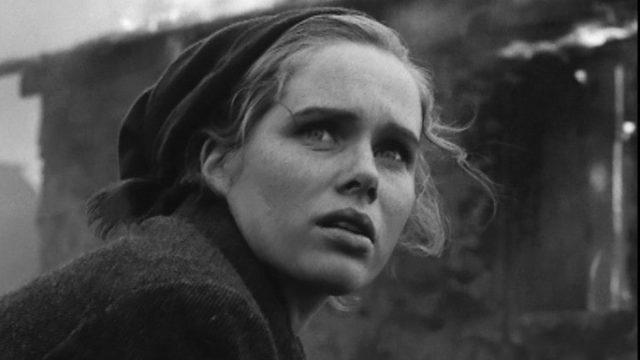Criterion Prediction #139: Shame, by Alexander Miller
Title: Shame
Year: 1968
Director: Ingmar Bergman
Cast: Liv Ullmann, Max Von Sydow, Gunnar Bjornstrand, Sigge Fürst, Birgitta Valberg
Synopsis: A mild-mannered couple, Jan (Sydow) and Eva (Ullmann), reside on a remote island while a civil war is waged around them. Despite their neutrality circumstances pull them into the conflict straining their relationship and their morals as they face the horrors of war.
Critique: Ingmar Bergman made a war movie. That feels about as strange as saying “Terrence Malick is going to direct the next Justice League movie” (I’d pay to see that though). And Shame is more than a terse, allegorical war film; there are soldiers sporting machine guns, explosions, fires, and jets. But this is still recognizable Bergman territory. It’s a small cast of recognizable players from his stock company. The locale is the remote Faro Island, which the director took as his residence and used as a location for the bulk of his career (post Through a Glass Darkly). The saturated black and white photography is by the director’s recurring cinematographer Sven Nykvist. The film is still worked out in measured scenes with static framing and dialogue-driven character development. But, Shame is visibly more ambitious; Bergman isn’t trying on a new coat in exploring war but is finding a new means of excavating revelatory emotions and psychological layers.
Sure, it delves into the inherent existential tumult of war. And Bergman pushes the protagonists, Eva and Jan and how far they are willing to shame themselves, making us wonder if their actions are a product of their need to survive, or is this couple already doomed, and their disintegration an inevitability that is accelerated by this nondescript civil war.
Personal dissolution, the disintegration of relationships and the internalized struggle of identity; this is all common thematic territory for Bergman but Shame doesn’t rest on religion or any faith-based narrative. War is somewhat new for the director (The Silence had it rumbling in the background) but at this point in his career, as he veered from more romantic, period dramas, his heady explorations became more internal and consolidated. These stark realizations are shorn of period atmosphere, superfluous set dressings and flashy camera movements. Bergman’s oeuvre post Through a Glass Darkly is intimate, modern and as a result, more emotionally charged and affecting. Shame marks an ascension for a director who was continually growing. Shame is a provocative and jarring title that is a singular entry in the director’s filmography. This modern era yielded some of Bergman’s best work and, following Persona and The Hour of the Wolf, Shame is one of his strongest.
Less angsty and more incisive here, Bergman is making a statement rather than postulating philosophical quandaries and it’s evident that he’s striving to do so without having a partisan attitude.
Why It Belongs in the Collection: There was a period when Criterion had released a bulk of classic and contemporary films from Bergman. The Seventh Seal, Wild Strawberries, The Virgin Spring, Fanny and Alexander, Scenes from a Marriage, Autumn Sonata, Smiles of a Summer Night, The Magic Flute, Through a Glass Darkly, Winter Light, and The Silence. Later on, they would include an Eclipse set with five of his earlier works, Summer Interlude, Summer with Monika, The Magician and Sawdust and Tinsel. But the major release that proved Criterion could break into this series of Bergman movies by releasing Persona. A movie that was formally exclusive to an MGM/UA set that also contained said film, along with The Serpents Egg, The Passion of Anna, The Hour of the Wolf, and a disc of supplemental materials. While I don’t think anyone will mourn the relative absence of The Serpent’s Egg (one of the directors more panned efforts), there’s still a viable market for Criterion to release The Passion of Anna, The Hour of the Wolf (Criterion Prediction #60) and, of course, Shame. Seeing as Persona was such a successful title for them, it makes sense to draw from this prolific era of Bergman’s career.



























